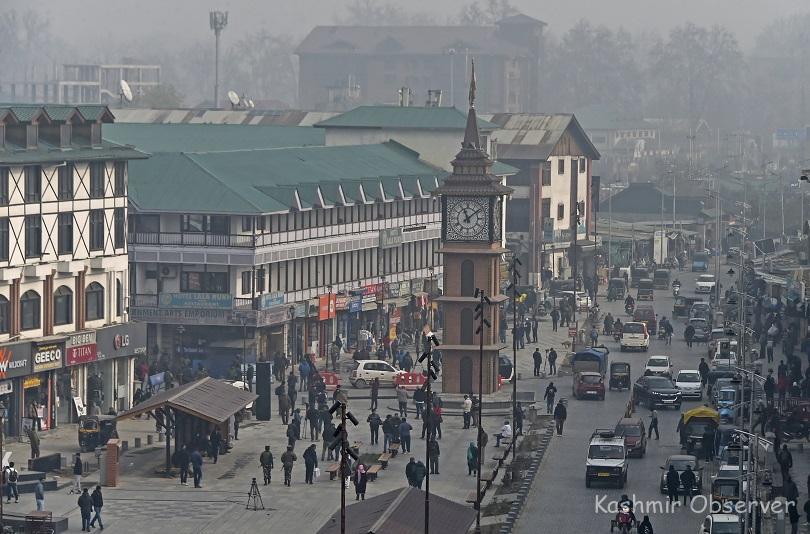(MENAFN- Kashmir Observer) Srinagar- Long buffeted by the winds of conflict, Jammu and Kashmir is gearing up for a general election that will be the first significant political activity after the revocation of its special status in 2019 and is characterised by contrasting political narratives and agendas.
At stake are five Lok Sabha seats - Baramulla, Srinagar and Anantnag in Kashmir Valley that are with the National Conference (NC), and Jammu and Udhampur in Jammu represented in the House by the BJP. Ladakh, which was carved out as a separate union territory after reorganisation of the state on August 19, 2019, is also with the BJP.
ADVERTISEMENT
Discussing the critical question of when assembly elections will be held, Chief Election Commissioner Rajiv Kumar said in Delhi on Saturday they will take place after the Lok Sabha polls. Organising both simultaneously is not viable from the security point of view, he said.
Regional parties National Conference and the PDP, both members of the INDIA bloc, are expected to push for the restoration of Article 370 to underscore their fight for autonomy for the region as campaigning hots up. The BJP, which has pushed the abrogation of Article 370 as amongst its big achievements, will be stressing on the surge in tourists, the infusion of investments in the union territory and its commitment to eradicating terrorism.
Also in the mix is the Congress, which unlike the others, lacks a clear strategy to navigate the complex political landscape of Jammu and Kashmir. The absence of a cohesive narrative might prove to be a significant obstacle for the party in the upcoming elections.
Read Also LS Polls Begin On April 19, Results On June 4; MCC Kicks In Parliament Polls In J&K To Be held In 5 Phases The divergent ideologies and promises will play out against the backdrop of a region striving to define its political future in a post-special status era.
KEY SEATS
*Srinagar:
The Srinagar Lok Sabha constituency now encompasses 19 assembly segments after a recent delimitation exercise following the abrogation of Article 370. It is currently held by Farooq Abdullah of the National Conference, which will face a challenge in retaining the constituency, especially if the PDP decides to contest from here.
The PDP, a part of the INDIA alliance, is still contemplating its strategy in response to the NC's decision to contest all three Lok Sabha seats in the Valley. While NC leaders cite incumbency to argue that they will fight from all three seats, the PDP has expressed its problems with what they perceive is the party's unilateral move.
Following the delimitation exercise, the constituency now includes six seats from Shopian and Pulwama districts while two assembly segments from Budgam district have been excluded.
*Jammu:
BJP's incumbent MP Jugal Kishore Sharma will be trying his luck for the third consecutive term from the Jammu Lok Sabha constituency, which was reshaped on the recommendations of the delimitation commission two years ago.
The INDIA bloc, with the Congress, NC and PDP, is yet to announce the official candidate. But there is likelihood that the Congress will field its candidate, supported by coalition partners, from the seat.
Here is how the two main parties, NC and BJP, stack up:
NATIONAL CONFERENCE:
Strengths:
*The party has a well-established grassroots network and support base.
*Being one of the oldest political parties, it has a rich political legacy in the region.
*The National Conference has had strong leadership over the years, namely the Abdullah family.
*Regional appeal: The party has a strong regional appeal and has traditionally represented the interests of the people of Jammu and Kashmir.
Weaknesses:
*National Conference may struggle with outreach beyond its traditional support base in Jammu and Kashmir.
*Internal factionalism within the party could weaken its overall effectiveness.
*The region's security situation can pose challenges to the party's activities and political campaigning.
Opportunities:
*With changing political dynamics in Jammu and Kashmir, there may be opportunities for the National Conference to adapt and expand its influence.
*By focusing on engaging the youth population, the party can secure its future leadership and support base.
*Forming strategic alliances with other political parties could help strengthen the party's position in the region.
*By focusing on good governance and development initiatives, the party can enhance its public image and appeal.
Threats:
*The region's political environment is prone to instability, which could pose a threat to the party's operations.
*Facing strong competition from other political parties in the region could threaten the National Conference's electoral prospects.
*Ongoing security challenges in Jammu and Kashmir could disrupt the party's activities and hamper its political efforts.
*Shifting demographics and preferences among the population may pose a threat to the party's traditional support base.
BJP:
Strengths:
*Strong organisational structure, significant support in certain regions, association with central government, effective leadership.
*The party has also increased its presence among the youth.
Weaknesses:
*Limited support in certain areas, challenges in coalition building, historical tensions with local populations, perception issues.
Opportunities:
*Potential for growth in new segments, room for policy innovation, scope for improving regional relationships.
Threats:
*Competition from other parties, security challenges, backlash from certain communities, changing political landscapes.
Follow this link to join our WhatsApp group : Join Now




















Comments
No comment